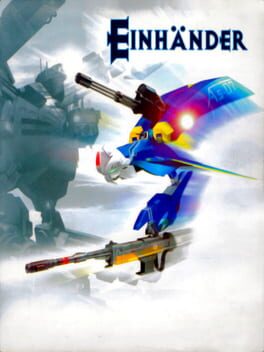It takes a lot of guts to release a licensed game that never directly references the name of the anime it’s based on. In fact, the resulting confusion about Einhander’s story is so prevalent that it’s totally eclipsed the discussion of the game itself, but I can hardly blame anyone for focusing on that. It’s a nice shoot-em-up and all, picking up and switching between weapon pods is fun and the control is excellent, but at the end of the day it’s still a pretty standard genre title. What elevates it is its presentation, with its dynamic camera, excellent soundtrack, and the aforementioned mystery surrounding its story. If you go in without knowing the background, all this business about Selene sending Einhanders on desperate attacks to Sodom to destroy resources and collect data for the EOS computer is so bewildering that it makes your imagination run wild. The developers likely predicted that confusion to some degree, and provided a wall of text in the attract mode to introduce the history of the moon wars and the return of Gesetz, but that really isn’t enough to contextualize seven stages worth of background details. It’s really a shame, because playing this game after watching all 26 episodes made it feel like a greatest-hits album, replicating some of the best battles that 90’s mecha had ever seen in a faithful and stylish way.
Now, to do you a favor that the Einhander team at Square never did, I’ll go ahead and confess that such an anime never actually existed. All those plot points are real, but for some reason they belong to a 3-hour shmup instead of a long-running show. Not only that, they’re presented in a strangely quiet way, being hidden in results screens, the signs in the background, and even the gallery mode. There’s very little reason for them to be in this game at all, but as you may have guessed, that’s exactly what I love about Einhander. The developers came up with this really deep background even though it was entirely unnecessary, showing that they didn’t just set out to make a cheap game in a genre with a steady audience, they were real fans. It gives the game a certain sparkle that’s impossible to fake, and it makes me wonder about the potential for storytelling in genres not normally associated with stories at all. Maybe the concept of playing as someone unimportant to the grand scheme of a much larger, world-scale story could be explored a bit more. Maybe it would be fun to create adaptations of nonexistent media. The amount of ways for games to tell a story feels like it still has tons of untapped potential, and I’m glad that a weird shoot-em-up from 1997 ended up being the perfect example.
Now, to do you a favor that the Einhander team at Square never did, I’ll go ahead and confess that such an anime never actually existed. All those plot points are real, but for some reason they belong to a 3-hour shmup instead of a long-running show. Not only that, they’re presented in a strangely quiet way, being hidden in results screens, the signs in the background, and even the gallery mode. There’s very little reason for them to be in this game at all, but as you may have guessed, that’s exactly what I love about Einhander. The developers came up with this really deep background even though it was entirely unnecessary, showing that they didn’t just set out to make a cheap game in a genre with a steady audience, they were real fans. It gives the game a certain sparkle that’s impossible to fake, and it makes me wonder about the potential for storytelling in genres not normally associated with stories at all. Maybe the concept of playing as someone unimportant to the grand scheme of a much larger, world-scale story could be explored a bit more. Maybe it would be fun to create adaptations of nonexistent media. The amount of ways for games to tell a story feels like it still has tons of untapped potential, and I’m glad that a weird shoot-em-up from 1997 ended up being the perfect example.
